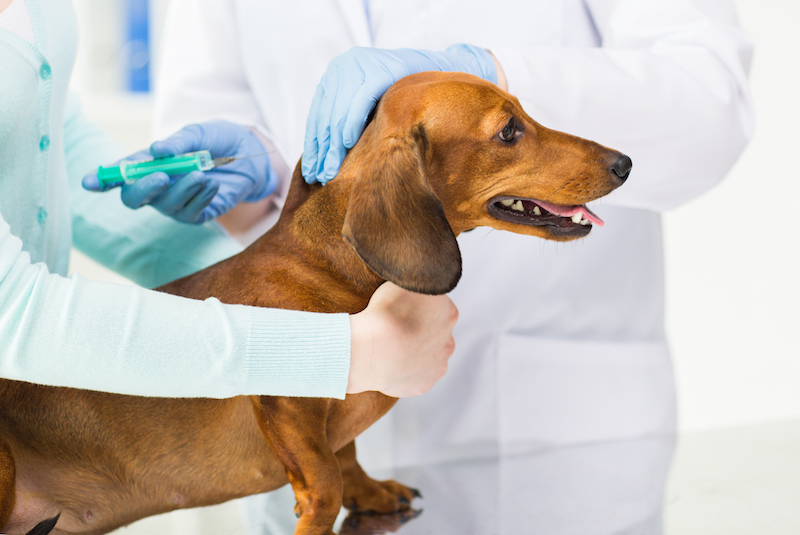Like their human companions, dogs have health care needs, the most important part of which is vaccinations. And since they can’t go get vaccinated themselves, it falls upon their owners to follow recommended vaccinations schedules in general, and the veterinarian’s in specific. Puppy vaccinations happen during the first year of life and include a variety of shots that protects dogs against illnesses, parasites, and rabies. The shots during puppyhood are followed up by booster shots as dogs get older.
The cost of vaccinating your puppy will vary greatly depending mostly on where you live—in larger metropolitan areas with high population density, the vaccination prices are bound to be higher compared to rural areas. The basic set of vaccines will generally cost between $65 and $125. If vaccination costs are a big concern, you may want to consider getting a dog from a shelter as any shelter dog will have up-to-date vaccinations appropriate for its age. And the vaccination cost for adult dogs is considerably lower than that of puppies.
Vaccines and Vaccination Schedule
There are some basic vaccines which are required for every dog, and some which are highly recommended but not absolute requirements. It is a good idea to follow the recommendations of your veterinarian on the optional shots as they will be tailored for your dog’s specific needs.
Caine Distemper: This vaccine protects against a virus which targets the respiratory, gastrointestinal, and nervous system. Infection results in ocular and nasal discharge, elevated body temperature, coughing, vomiting, seizures, muscle spasms, vomiting, and even paralysis; and often results in death. The canine distemper vaccine is a core shot which is a requirement.
- Vaccination at 6-8 weeks of age
Canine Hepatitis: This vaccine protects against a virus that is different than the form of hepatitis that infects humans. Infection results in minimally elevated body temperature, congested mucus membrane, enlargement of the stomach cavity, jaundice, vomiting, and abdominal pain concentrated around the liver. Once infected there is no cure for canine hepatitis. While the mild form of an infection can be managed, severe forms of the disease can and do result in death.
- Vaccination at 10-12 weeks of age, as part of the DHPP (distemper, hepatitis, parainfluenza, parvovirus) combination. Boosters at 14-16 weeks, 12-16 months, & 1-2 years thereafter.
Parvovirus: This vaccine protects against a virus that impacts the gastrointestinal system. Infection results in loss of appetite, elevated body temperature, vomiting, and usually in diarrhea with high severity and blood. The disease can also result in a quick onset of extreme dehydration which can result in a fatality within 48 hours. There is no cure for this type of infection, so it is important to keep the dog hydrated, and control symptoms until the dog’s natural immune system is able to overcome the viral infection. If any of the signs of such infection are noticed, it is crucial that a veterinarian be consulted to prescribe proper course of action.
- Vaccination at 10-12 weeks of age, as part of the DHPP (distemper, hepatitis, parainfluenza, parvovirus) combination. Boosters at 14-16 weeks, 12-16 months, & 1-2 years thereafter.
Rabies: The most familiar virus to pet owners and non-pet-owners alike, the rabies virus results in headaches, anxiety, extreme drooling, hallucinations, fear of water, full or partial paralysis, and eventually death. The virus attacks the central nervous system. Due to the severity of the results of an infection and the level of contagiousness, rabies has strict requirements under the law, which can vary based on geographic area.
- Vaccinations at 12-16 months of age. Boosters at 12-16 months & every 1-3 years.
Some non-core but recommended vaccinations include:
- Bordetella Bronchiseptica
- Canine Parainfluenza
- Corona Virus
- Heartworm
- Kennel Cough
- Leptospirosis
- Lyme Disease

